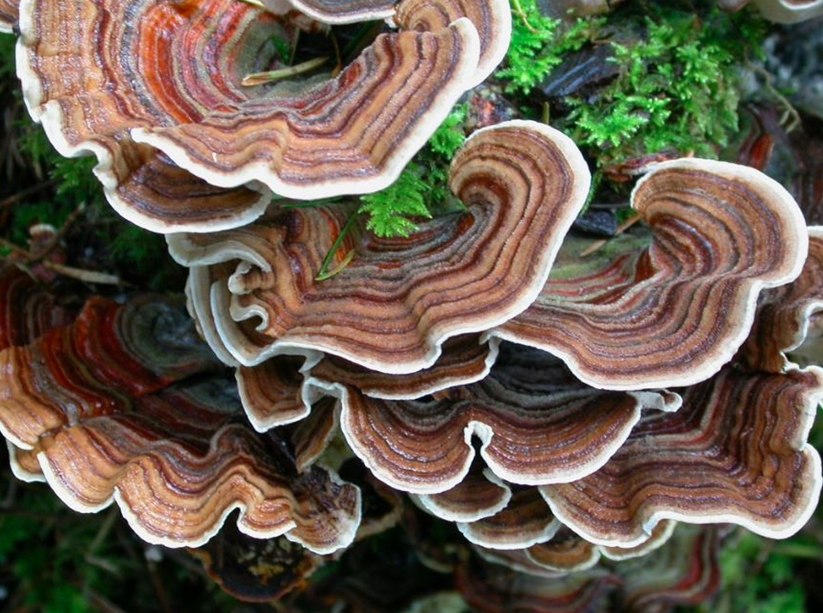Updates
Turkey Tail Mushroom: A Powerful Immune-Boosting Superfood
What is Turkey Tail Mushroom?
Turkey tail mushroom, also known as Trametes versicolor, is a type of mushroom that grows on trees and logs in forests around the world. It is called turkey tail because its colorful rings resemble the feathers of a turkey’s tail. Turkey tail mushroom has been used for centuries in traditional medicine practices in China, Japan, and other countries.
Turkey Tail Mushroom’s Nutritional Profile
Turkey tail mushroom is a rich source of polysaccharides, including beta-glucans, which are complex sugars that are thought to have immune-boosting properties. It also contains other important compounds such as antioxidants, amino acids, and minerals such as selenium and copper.
Turkey Tail Mushroom’s Health Benefits
Turkey tail mushroom has numerous health benefits, which have been extensively studied in recent years. The following are some of the most notable benefits of turkey tail mushroom.
Turkey Tail Mushroom and Cancer
Turkey tail mushroom has been shown to have potential cancer-fighting properties. Studies have suggested that turkey tail mushroom extract may inhibit the growth and spread of cancer cells, particularly in breast and colon cancer. In addition, turkey tail mushroom has been found to enhance the effects of chemotherapy and radiation therapy in cancer patients, reducing the severity of side effects and improving overall quality of life.
Turkey Tail Mushroom and Immune System Support
One of the most well-known benefits of turkey tail mushroom is its ability to support the immune system. This is due to its high polysaccharide content, which stimulates the activity of immune cells and enhances the body’s ability to fight off infections and diseases. Studies have shown that taking turkey tail mushroom supplements can improve the immune response in people with various conditions, including HIV/AIDS and hepatitis C.
Turkey Tail Mushroom and Gut Health
Turkey tail mushroom has been found to have prebiotic properties, meaning that it helps to support the growth of beneficial bacteria in the gut. This can have a positive impact on overall gut health, as well as immune function and inflammation. In addition, turkey tail mushroom may help to alleviate symptoms of gastrointestinal disorders such as ulcerative colitis and irritable bowel syndrome (IBS).
Turkey Tail Mushroom and Antioxidant Properties
Turkey tail mushroom contains powerful antioxidants such as phenols and flavonoids, which help to protect the body against damage from free radicals. Free radicals are unstable molecules that can cause oxidative stress, which is a leading cause of aging and disease. By neutralizing free radicals, antioxidants can help to prevent cellular damage and reduce the risk of chronic diseases such as cancer, heart disease, and Alzheimer’s.
Turkey Tail Mushroom and Anti-Inflammatory Properties
Inflammation is a natural response of the immune system, but chronic inflammation can contribute to a range of diseases such as arthritis, diabetes, and heart disease. Turkey tail mushroom has been found to have anti-inflammatory properties, which may help to reduce inflammation in the body and alleviate symptoms of inflammatory conditions.
Turkey Tail Mushroom and Cardiovascular Health
Turkey tail mushroom may have beneficial effects on cardiovascular health by reducing levels of LDL cholesterol (the “bad” cholesterol) and triglycerides in the blood. Studies have also shown that turkey tail mushroom extract can improve blood flow and reduce oxidative stress in people with chronic heart failure.
Turkey Tail Mushroom and Respiratory Health
Turkey tail mushroom has been found to have potential benefits for respiratory health. In particular, it may help to alleviate symptoms of respiratory infections such as bronchitis and pneumonia, due to its immune-boosting and anti-inflammatory properties. In addition, turkey tail mushroom has been shown to improve lung function in people with chronic obstructive pulmonary disease (COPD).
Turkey Tail Mushroom and Skin Health
Turkey tail mushroom may also have benefits for skin health. Studies have suggested that its antioxidant and anti-inflammatory properties may help to reduce the appearance of fine lines, wrinkles, and other signs of aging. In addition, turkey tail mushroom has been found to have antimicrobial properties, which may help to prevent or treat skin infections.
How to Use Turkey Tail Mushroom
Turkey tail mushroom is available in various forms, including supplements, teas, and tinctures. Supplements are typically available in capsule or powder form, and can be taken daily to support immune function and overall health. Turkey tail mushroom tea can be made by steeping dried mushrooms in hot water for several minutes. Tinctures, which are concentrated liquid extracts, can be added to water or other beverages.
Potential Side Effects and Precautions
While turkey tail mushroom is generally considered safe for most people, there are some precautions to keep in mind. People who are allergic to mushrooms should avoid using turkey tail mushroom. In addition, there is some concern that turkey tail mushroom may interact with certain medications, such as blood thinners and immunosuppressants. As always, it is important to talk to your healthcare provider before starting any new supplement or herbal remedy.
Conclusion
Turkey tail mushroom is a powerful superfood with numerous health benefits. Its immune-boosting, antioxidant, and anti-inflammatory properties make it a valuable addition to any wellness routine. Whether you prefer to take it in supplement form or enjoy a cup of turkey tail mushroom tea, this potent mushroom can help to support your overall health and well-being.
Citations:
1. Hsieh, C., & Wu, J. M. (2017). Regulation of breast cancer progression by medicinal mushroom Trametes versicolor. International journal of medicinal mushrooms, 19(8).
2. Lin, B., & Zhang, H. N. (2004). Anti-tumor and immunoregulatory activities of Ganoderma lucidum and its possible mechanisms. Acta pharmacologica Sinica, 25(11), 1387-1395.
3. Bower, E., Ganz, P. A., Desmond, K. A., Rowland, J. H., Meyerowitz, B. E., & Belin, T. R. (2000). Fatigue in breast cancer survivors: occurrence, correlates, and impact on quality of life. Journal of clinical oncology, 18(4), 743-753.
4. Wang, , Shi, L., Yang, F., Li, B. M., Liu, X. D., Guo, M., & Wang, J. H. (2012). Chemical constituents and medical benefits of the mushroom Trametes versicolor. International journal of medicinal mushrooms, 14(1), 69-78.
5. Khan, A., Tania, M., Liu, R., & Rahman, M. M. (2013). Hericium erinaceus: an edible mushroom with medicinal values. Journal of complementary and integrative medicine, 10(1).



















